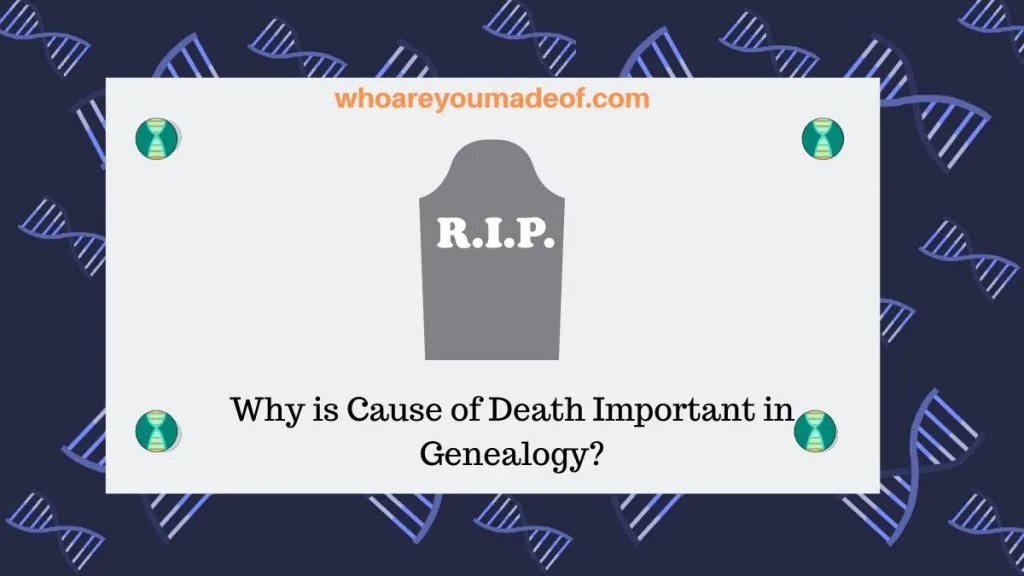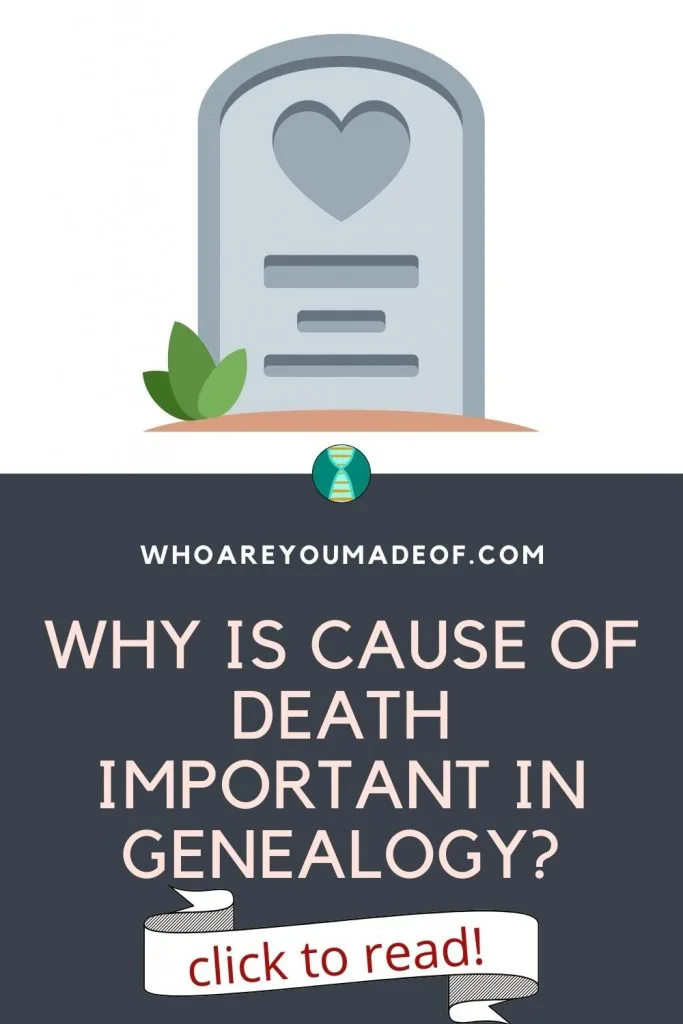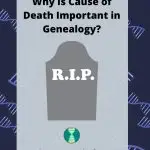Do you want to know why cause of death is important in your genealogy research? In this post, learn why cause of death is important, most common ways our ancestors died, and how to find cause of death.
I find myself spending lots of time trying to decipher someone's handwriting on a death certificate to determine the cause of death of my ancestor. Sometimes, the words used are antiquated and don't seem to match with illnesses or situations that I am familiar with.

It can be rather frustrating, and so it led me to wonder if it is really important to figure out how my ancestors or other relatives passed. I have included the most compelling reasons that cause of death is a vital detail to include in our family tree research.
Writing this post helped clarify this question for me, and I hope it does the same for you.
What information of interest to a genealogist is likely to be found on a death certificate?
At first glance, we might think that cause of death is an unimportant detail that only those with a morbid curiosity might find interesting. At the time of death, of course, the cause of the illness or accident is of utmost importance to the health of the local community or broader region.
Even years, or generations, after someone's passing, we can still find understanding the reason that they died to be relevant to our life and genealogy research. Naturally, we might find the causes of death for our more recent ancestors more pertinent to our current circumstance than our distant ones.
Even so, even the cause of death for our very distant ancestors can be fascinating and very useful for research purposes.
Cause of death for our ancestors can give context
Many of our ancestors died from illnesses or accidents that were prevalent in their local community during their lives. Therefore, learning about the cause of death can help us understand our ancestor's life and death in the broader context of their historical time period.
For example, some people reading this article may find that one or more of their ancestors died of tuberculosis, which was also known as the Great White Plague. This illness, often referred to as "consumption", was the leading cause of death in the United States during the late 1800s.
Cause of death can help us understand more about their life
If we know how our ancestors and their closest relatives died, we can often gain a greater understanding about the decisions that they made in their life.
One of my great-great grandparents sold everything he had and went out west to search for gold. He was a day late, and possibly, a few dollars short, as the old expression goes.
In the end, he didn't find enough gold to make a measurable difference in his fortune. There is a family story about a big nugget of gold that was passed down, though I certainly never saw it.
When I first learned about this story, I was judgemental of my great-great grandfather. How could he take such a foolish risk?
He sold everything he had and left his wife and children in order to pursue a very unlikely outcome.
Upon closer examination of my great-great grandfather's life, I learned that his beautiful wife had died at the age of 28 of pneumonia. She left behind a one year old son, my direct ancestor, and a daughter.
Pneumonia was a disease that was not well understood in the 1800s. People did not know that it was often caused by bacteria, or how it was transmitted. Sometimes, the sick were even accused of being immoral or slothful.
In addition, the treatment for pneumonia was quite barbaric, ineffective, and often harmful. Antibiotics did not yet exist as a treatment.
My great-great grandfather's own limited understanding of what had caused his young wife to become ill and quickly lose her life may have affected his decision-making.
This was in the year 1880, and I can only imagine how devastated he must have felt after this loss. What would he do with two children, one and three, all on his own?
What he did, I learned, was leave his young children with his brother and sister-in-law. He went west, which is where he tried to mine for gold. Eventually, he married his second wife near his small Colorado gold mine, and brought her back east to grow his family.
Cause of death can help you know where to look for more genealogical details
Is there someone in your family tree that died in a violent manner or just disappeared with no explanation? It is often these circumstances that can provide clues as to where we might be able to look - or not look - for other genealogical information.
For example, I have an ancestor who died in a train accident, which I learned from his death certificate. Once I learned this detail, I realized that there might be information in the local newspaper about the train accident.
Indeed, there was! There was a very long write-up in the paper where he lived about his life and his tragic death. I was able to get an in-depth look at the way his community viewed him, which was very interesting.
If the cause of death helps us figure out details about our ancestor's lifestyle, such as their occupation (i.e. black lung disease), we might be able to find other genealogy records, such as employment transcripts or other documents pertaining to their life.
Finally, if we know that an ancestor simply disappeared or died in a distant battle, or while traveling, we know that we aren't likely to find a gravestone in the local family cemetery.
Cause of death for ancestors can provide health information for our families
If you spend any time at all with your family tree, you'll discover a lot about the when and how your ancestors died. It can be a sad and emotional journey, at times, but it might also help us live a healthier life.
While the cause of death for very distant ancestors is not often relevant to our modern lives, we can occasionally spot trends that can help us build a comprehensive medical history of our family. This information can be useful in understanding diseases and other health issues occurring in our family.
Not every illness is genetic, but understanding the medical challenges that our ancestors faced can be enlightening.
How did our ancestors die?
Modern medical advancements, such as vaccines, and protective labor laws, have shielded a majority of people in wealthier countries from the illnesses and accidents that were the most common causes of death for their ancestors.
For example, when is the last time you heard of someone dying of the bubonic plague?
The Black Death, as the plague was also called, can be easily treated with antibiotics. In fact, it is so easily treated nowadays that most people are unaware that it still exists.
While some issues that caused death for our ancestors remain causes of death today, there are other issues that modern family tree researchers might not be so familiar with. Some of causes of death that we might see on death certificates for our ancestors include:
- Dropsy (swelling, or edema)
- Spontaneous combustion (based on the belief that people could catch fire because they drank too much)
- Milk sickness, which was the cause of death of Abraham Lincoln's mother (poisoning due to drinking milk from cows that ate White Snakeroot, which is poisonous to humans)
- Bright's disease (kidney illness)
- Yellow fever (mosquito-borne)
- Camp fever
- Grippe (an old-fashioned name for influenza)
- Nostalgia
- Quinsy
- Debility (literally, the "state of being weak", a seemingly catch-all term for people who just inexplicably faded away, likely due to various diagnosed illnesses)
There are dozens more causes of death, and some will be more familiar to you than others. Fortunately, it is fairly easy to figure out the modern equivalent for many old illnesses that we might find on death certificates.
How to find cause of death for an ancestor
You should be able to find the cause of death for your ancestor by obtaining or viewing a copy of their death certificate. The cause of death is usually not listed on indexes of death, though it sometimes might be.
This means that you might have to request a copy of your relative's death certificate from the place where they died. For older records, this often means that you might have to contact the state archives where your ancestor lived.
In order to find out exactly where your ancestor's death certificate might be, you can research the state where you believe they lived at the time of their death. A Google search using the terms "name of state + genealogy death records" will probably provide you with results that can help you figure out whether you could get a copy of the certificate at the county or state level.
More recent records might require you to prove your relationship to your ancestor.
Even though death certificates were not officially recommended in the United States until January 1, 1900, many jurisdictions issued them long before that date. For this reason, you might be able to obtain actual death certificates for ancestors who passed in the mid to late-1800s.
If you are unable to find a death certificate for your ancestor, or if there was no certificate issued, you still might be able to determine cause of death. Newspaper articles, death indexes, and genealogy research of other relatives might provide some clues.
Conclusion
I sincerely hope that this post has helped you get a better idea as to why the cause of death is an information genealogical detail to add to your family tree research. If you have any questions about something that you read, or if you would like to add your own reason that cause of death is important, I would love for you to post in the discussion below.
Thank you for reading this post today!



Marion
Saturday 14th of December 2024
I've been fascinated by cause of death for some time now, so was glad to see your post because some of our families have heritable conditions that may lead to illness and early death. I've tried to track these, but as you point out they are often difficult to find. Your post seems to be orientated towards research in the USA. Do you have any suggestions for the wider readership? England, Europe, the Scandinavian countries?
Marion
Saturday 14th of December 2024
See nihms49235 on PubMed for the importance of family history to modern day health care.
Pauline Trumpi
Sunday 12th of November 2023
I liked your account about your great, great grandfather. Without your post, I would not have remembered what I was told about my great grandfather'a kidneys. Thank you!
The recorded causes of death are so interesting. Dropsy, for example. That would indicate congestive heart failure.
More than a century ago, many people did not realize the connection between unclean water supply and causes of death. More than anything else, a clean water supply changed everything. Also, it's good to realize how vaccines have contributed so greatly to present-day health. Knowing what I do, I hope no one decides to discontinue the polio vaccine!
Pauline Trumpi
Sunday 12th of November 2023
@Pauline Trumpi, Correction: grandfather's
Dan Myers
Sunday 9th of May 2021
Mercedes, I have a public tree linked to my DNA. I also have a small additional tree for the purpose of trying to check a possible parent that is not in my public tree.
I have DNA matches with the only two grandchildren of their grandfather. l suspect this grandfather is my father for two reasons. His one granddaughter has a 823 cM (second on my DNA list), and the second granddaughter has a 717 cM (5th on my DNA list of hundreds). The second reason, my fathers (the man I've believed all my life to be my genealogical father) comes from a very large family. From his line, I have not been able to find any DNA connections while on my mother's side there are many. The grandfather of the two grandchildren mentioned above had unlimited opportunities to be my father. He and his wife actually provided a home for my mother before her marriage to my assumed father.
Now my question: I believe I'm correct that I can link my DNA to only one tree. Is there a way to link to this small tree which includes three generations of my suspected father? In that tree, I'm also present as well as my mother. All members of that tree have now passed with the exception of one of the granddaughters.
Thank you,
With appreciation for your excellent weekly letters.